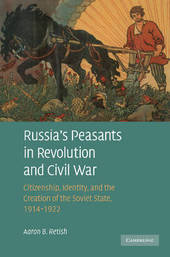
|
Russia's Peasants in Revolution and Civil War: Citizenship, Identity, and the Creation of the Soviet State, 1914-1922
Paperback / softback
Main Details
| Title |
Russia's Peasants in Revolution and Civil War: Citizenship, Identity, and the Creation of the Soviet State, 1914-1922
|
| Authors and Contributors |
By (author) Aaron B. Retish
|
| Physical Properties |
| Format:Paperback / softback | | Pages:310 | | Dimensions(mm): Height 229,Width 152 |
|
| ISBN/Barcode |
9781107404724
|
| Classifications | Dewey:947.0841 |
|---|
| Audience | | Professional & Vocational | |
|---|
| Illustrations |
Worked examples or Exercises
|
|
Publishing Details |
| Publisher |
Cambridge University Press
|
| Imprint |
Cambridge University Press
|
| Publication Date |
23 February 2012 |
| Publication Country |
United Kingdom
|
Description
How did peasants experience and help guide Russia's war, revolution, and civil war? Why in the end did most agree to live as part of the Bolshevik regime? Taking the First World War to the end of the Civil War as a unified era of revolution, this book shows how peasant society and peasants' conceptions of themselves as citizens in the nation evolved in a period of total war, mass revolutionary politics, and civil breakdown. Aaron Retish reveals that the fateful decision by individuals to join the Revolution or to accommodate their lifestyle within it gave the Bolsheviks the resources and philosophical foundation on which to build the Soviet experiment and reshape international politics. He argues that peasants wanted more than land from the Revolution; they wanted to be active citizens. This is an important contribution to our understanding of the nature of the Russian Revolution and peasant-state relations.
Reviews'This marvellous book, a model of the sort of regional studies that are still so badly needed in the study of the Russian revolution and Civil War. The range and depth of scholarship deployed is extraordinary in its detail, and yet the end product is written fluidly and lucidly.... Given the wealth of material assembled here, it is difficult to argue with Retish's conclusion that 'Viatka's peasants did not shy away from the changes around them [but] sought out the state and actively worked to be part of the revolution and nation' (p. 265). Revolutionary Russia '... readers will find a great deal to applaud in Retish's interdisciplinary study ...' The Journal of Interdisciplinary History '... should be praised for its ambitious yet carefully crafted research design, subtle formulation of the main methodological focus, and broad engagement of the latest trends in historiography. ... a book that should be credited for its comprehensive research design, a good acquaintance with mainstream methodological literature, and considerable effort invested in research in regional archives.' Ab Imperio
|